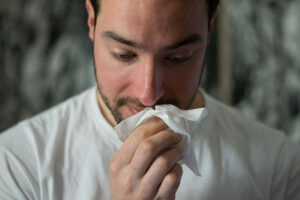Many types of allergies are associated with acne, like skin, food, and clothing. It’s more common than you think. But what kinds of allergies can trigger an acne breakout? That’s what we’re about to discuss.
What Kinds of Allergies Cause Acne?
Here’s a brief roundup of allergies that can cause acne.
Skincare Products
Believe it or not, your skincare routine might be the culprit to the sudden emergence of acne on your face. If this happens, breakouts can quickly appear all over your body, which is why it is important to keep a log of any new products you try. This is common in many makeup and beauty products containing alcohol and chemicals. When it comes to a skincare regimen, I am always a proponent of “less is more.”
Ideally, you should test any new product on a tiny area of your skin (commonly referred to as a “patch test”), and wait one day. If you don’t see any allergic reactions, then you’re good to use it regularly.
Natural products are much less likely to trigger allergic reactions and are usually just as good at fighting acne breakouts as chemical products.. Because of this it’s important to use non-comedogenic cleansers that reduce redness and scarring.
Food Intolerances
Many people are also surprised to learn that food allergies and intolerances can directly impact skin quality and complexion.
Leaky gut syndrome is a common health condition that’s believed to be the relation between food allergies and acne. It makes you more sensitive to various types of food. Also, it causes leakage of toxins and other materials from the small intestine, prompting an immune reaction throughout the body that takes the form of acne. One example of this is dairy, which causes acne breakouts in a lot of people.
The catch here is that systemic inflammation triggers many allergic reactions, including acne.
Other possible scenarios exist for the relation between food intolerances and acne, but none have solid scientific evidence.
If you want more information on the relationship between acne and food, check this E-book.
Clothing Sensitivities
Clothing sensitivities are more common than most people believe because they have many causative agents. For instance, you might be allergic to the detergent used in washing clothes and sheets or the manufacturing materials of clothes.
Either way, the antibody cells in your skin will recognize the allergens and identify them as threatening. When this happens, they’ll send signals to your body to release histamines, which will fight the foreign allergens.
The production of histamines might cause many allergy symptoms like acne, runny nose, watery eyes, and skin blisters.
Additionally, if you do not wash clothing that frequently comes into contact with you face, such as your pillow case, the oil from your face will stick to the clothing and rerub against your face every time you come into contact with it. To mitigate the chances of this happening you should always wash your face before bed and change your pillowcases two times per week.
Other Skin Allergy Symptoms
Here’s a list of the other skin allergy symptoms that you might experience:
- Rashes and itching
- Redness
- Eczema (Dry and cracked skin)
- Raised skin bumps
- Swelling
- Flaking of skin
Types of Foods That Can Cause Acne Breakouts
Many types of food can cause acne breakouts if you consume them regularly. Here’s a quick list of the most common ones.
1. Dairy
Although many studies have proven the correlation between dairy products and acne breakouts, the cause of this relationship remains unknown. Many scientists believe that it comes as a result of dairy products increasing insulin levels in the blood.
Insulin, in turn, stimulates the production of a growth hormone, IGF-1, that increases sebum oil production. When sebum oil increases, it clogs pores, causing pimples. However, research is still needed to prove this theory.
2. Alcohol
While alcohol doesn’t directly increase acne, it can stimulate many reactions in your body that, in turn, trigger acne.
For instance, alcohol is known to kill many protective cells inside your body, bringing its defense down a notch. As a result, your body becomes more vulnerable to bacterial infections, which are a common causative agent of acne.
Also, some studies show that alcohol can increase hormone levels in the body. Then, hormones stimulate body glands to produce more sebum oil, which can cause clogged pores and an acne breakout.
3. Carbs
When you ingest carbs, your blood sugar levels go up, so your body produces insulin to get them back to normal. While this process might look simple, it’s complex and involves many reactions and hormones.
As a matter of fact, insulin triggers the production of many other hormones that can trigger acne. For instance, IGF-1 is a growth hormone that causes an overproduction of skin cells and sebum oil. If your body doesn’t need the extra skin cells, overcrowding at the surface of your skin will occur, leading to pimples and bumps.
Also, large amounts of sebum can clog your pores and lead to the same result, an acne breakout.
Frequently Asked Questions
Here are a few tips to help you control skin allergy-induced acne:
Stay away from the allergen
Wash your hands with soap before touching your face
Use an anti-itch cream
Wash your face with a proper face wash for acne-susceptible skin
Apply light moisturizers to your face
According to studies, yes, stress can cause acne through different mechanisms. For instance, when your body is stressed, it releases stress hormones, which stimulate glands to produce more sebum oil. Also, stress hormones can affect the body’s ability to fight microbes, which increases the risk of a bacterial acne breakout.

